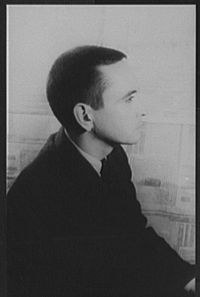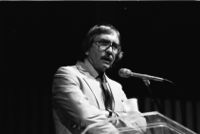Edward Albee
| Edward Albee | |
|---|---|
 Edward Albee, photographed by Carl Van Vechten, 1961 |
|
| Born | 12 March 1928 Washington D.C. |
| Occupation | Dramatist |
| Nationality | American |
| Period | 1958–present |
| Notable work(s) | Who's Afraid of Virginia Woolf? The Zoo Story The American Dream The Goat, or Who is Sylvia? |
| Notable award(s) | Pulitzer Prize for Drama (1967,1975,1994) Tony Award (2002) National Medal of Arts (1996) Special Tony Award (2005) |
|
Influences
Theatre of the Absurd
|
|
|
Influenced
Paula Vogel
|
|
Edward Franklin Albee III (pronounced /ˈɔːlbiː/ AWL-bee; born March 12, 1928) is an American playwright best known for Who's Afraid of Virginia Woolf?, The Zoo Story, A Delicate Balance and Three Tall Women. His works are considered well-crafted, often unsympathetic examinations of the modern condition. His early works reflect a mastery and Americanization of the Theatre of the Absurd that found its peak in works by European playwrights such as Jean Genet, Samuel Beckett, and Eugène Ionesco. Younger American playwrights, such as Paula Vogel, credit Albee's daring mix of theatricalism and biting dialogue with helping to reinvent the post-war American theatre in the early 1960s. Albee continues to experiment in new works, such as The Goat: or, Who Is Sylvia? (2002).
Contents |
Biography

According to Magill's Survey of American Literature (2007), Edward Albee was born somewhere in Virginia (the popular belief is that he was born in Washington, D.C.). He was adopted two weeks later and taken to Larchmont, New York in Westchester County, where he grew up. Albee's adoptive father, Reed A. Albee, the wealthy son of vaudeville magnate Edward Franklin Albee II, owned several theaters. Here the young Edward first gained familiarity with the theatre as a child. His adoptive mother, Reed's third wife, Frances tried to raise Albee to fit into their social circles.
Albee attended the Clinton High School, then the Lawrenceville School in New Jersey, from which he was expelled. He then was sent to Valley Forge Military Academy in Wayne, Pennsylvania, where he was dismissed in less than a year. He enrolled at The Choate School (now Choate Rosemary Hall) in Wallingford, Connecticut, graduating in 1946. His formal education continued at Trinity College in Hartford, Connecticut, where he was expelled in 1947 for skipping classes and refusing to attend compulsory chapel. In response to his expulsion, Albee's play "Who's Afraid of Virginia Woolf?" is believed to be based on his experiences at Trinity College.
Albee left home for good when he was in his late teens. In a later interview, he said: "I never felt comfortable with the adoptive parents. I don't think they knew how to be parents. I probably didn't know how to be a son, either."[1] More recently, he told interviewer Charlie Rose that he was "thrown out" because his parents wanted him to become a "corporate gangsta and didn't approve of his aspirations to become a writer.[2]
Albee moved into New York's Greenwich Village, where he supported himself with odd jobs while learning to write plays. His first play, The Zoo Story, was first staged in Berlin. The less than diligent student later dedicated much of his time to promoting American university theatre. He currently is a distinguished professor at the University of Houston, where he teaches an exclusive playwriting course.
Honors
A member of the Dramatists Guild Council, Albee has received three Pulitzer Prizes for drama—for A Delicate Balance (1967), Seascape (1975), and Three Tall Women (1994); a Special Tony Award for Lifetime Achievement (2005); the Gold Medal in Drama from the American Academy and Institute of Arts and Letters (1980); as well as the Kennedy Center Honors and the National Medal of Arts (both in 1996).
Albee is the President of the Edward F. Albee Foundation, Inc., which maintains the William Flanagan Memorial Creative Persons Center, a writers and artists colony in Montauk, New York. Albee's longtime partner, Jonathan Thomas, a sculptor, died on May 2, 2005, from bladder cancer.
In 2008, in celebration of Albee's eightieth birthday, a number of his plays were mounted in distinguished Off Broadway venues, including the historic Cherry Lane Theatre. The playwright directed two of his one-acts, The American Dream and The Sandbox there. These were first produced at the theater in 1961 and 1962, respectively.
Plays
|
|
Essays
- Stretching My Mind: Essays 1960–2005 (Avalon Publishing, 2005)
Quotes
- "What could be worse than getting to the end of your life and realizing you hadn't lived it?"
- "A usefully lived life is probably going to be, ultimately, more satisfying."[3]
- "Writing should be useful. If it can't instruct people a little bit more about the responsibilities of consciousness there's no point in doing it."
- "If you're willing to fail interestingly, you tend to succeed interestingly."
- "That's what happens in plays, yes? The shit hits the fan."
- "Creativity is magic. Don't examine it too closely."[4]
- "Sometimes it's necessary to go a long distance out of the way in order to come back a short distance correctly."
- "All serious art is being destroyed by commerce. Most people don't want to art to be disturbing. They want it to be escapist. I don't think art should be escapist. That's a waste of time."
Discography
- Mark Richman & William Daniels in The Zoo Story by Edward Albee - Directed by Arthur Luce Klein (LP, Spoken Arts SA 808)
Awards and nominations
- Awards
- 1960 Drama Desk Award Vernon Rice Award - The Zoo Story
- 1963 Tony Award for Best Play - Who's Afraid of Virginia Woolf?
- 1967 Pulitzer Prize for Drama - A Delicate Balance
- 1975 Pulitzer Prize for Drama - Seascape
- 1994 Pulitzer Prize for Drama - Three Tall Women
- 1996 National Medal of Arts
- 2002 Drama Desk Award Outstanding New Play - The Goat, or Who Is Sylvia?
- 2002 Tony Award for Best Play - The Goat, or Who Is Sylvia?
- 2005 Special Tony Award for Lifetime Achievement
- 2008 Drama Desk Award Special Award
- Nominations
- 1964 Tony Award for Best Play - The Ballad of the Sad Cafe
- 1965 Tony Award for Best Author of a Play - Tiny Alice
- 1965 Tony Award for Best Play - Tiny Alice
- 1967 Tony Award for Best Play - A Delicate Balance
- 1975 Drama Desk Award Outstanding New Play - Seascape
- 1975 Tony Award for Best Play - Seascape
- 1976 Drama Desk Award Outstanding Director of a Play - Who's Afraid of Virginia Woolf?
- 1994 Drama Desk Award Outstanding Play - Three Tall Women
- 2001 Pulitzer Prize for Drama - The Play About the Baby
- 2003 Pulitzer Prize for Drama - The Goat, or Who Is Sylvia?
- 2005 Tony Award for Best Revival of a Play - Who's Afraid of Virginia Woolf?
The Pulitzer Prize committee for the Best Play in 1963 recommended Who's Afraid of Virginia Woolf?, but the Pulitzer board, who have sole discretion in awarding the prize, rejected the recommendation, due to the play's perceived vulgarity, and no award was given that year.[5]
References
- ↑ "Edward Albee Interview", Academy of Achievement, June 2, 2005
- ↑ "Albee interview", The Charlie Rose Show, May 27, 2008
- ↑ Edward Albee Interview - page 6 / 6 - Academy of Achievement
- ↑ Edward Albee - Me, Myself & I - Peter and Jerry - Theater - New York Times
- ↑ Klein, Alvin. "Albee's 'Tiny Alice', The Whole Enchilada", The New York Times, 24 May 1998: CT11.
External links
- Edward Albee at the Internet Broadway Database
- Edward Albee at the Internet Off-Broadway Database
- Edward Albee at the Internet Movie Database
- Guardian (UK) Profile of Edward Albee, The Guardian, 2004
- "Edward Albee", The Paris Review
- Edward F. Albee Foundation website
- "Interviews with Edward Albee", TonyAwards
- Notes on a Colloquy with Edward Albee, Artslynx
- Performance by Edward Albee, Long House Theatre
- Cherry Lane Theatre website
- "The Friars Club"
- Who's afraid of Edward Albee, Laura Parker, Intelligent Life, 2009
- Solomon, Rakesh H. Albee in Performance. Bloomington: Indiana University Press, 2010.
|
||||||||
|
||||||||
|
|||||
|
|||||